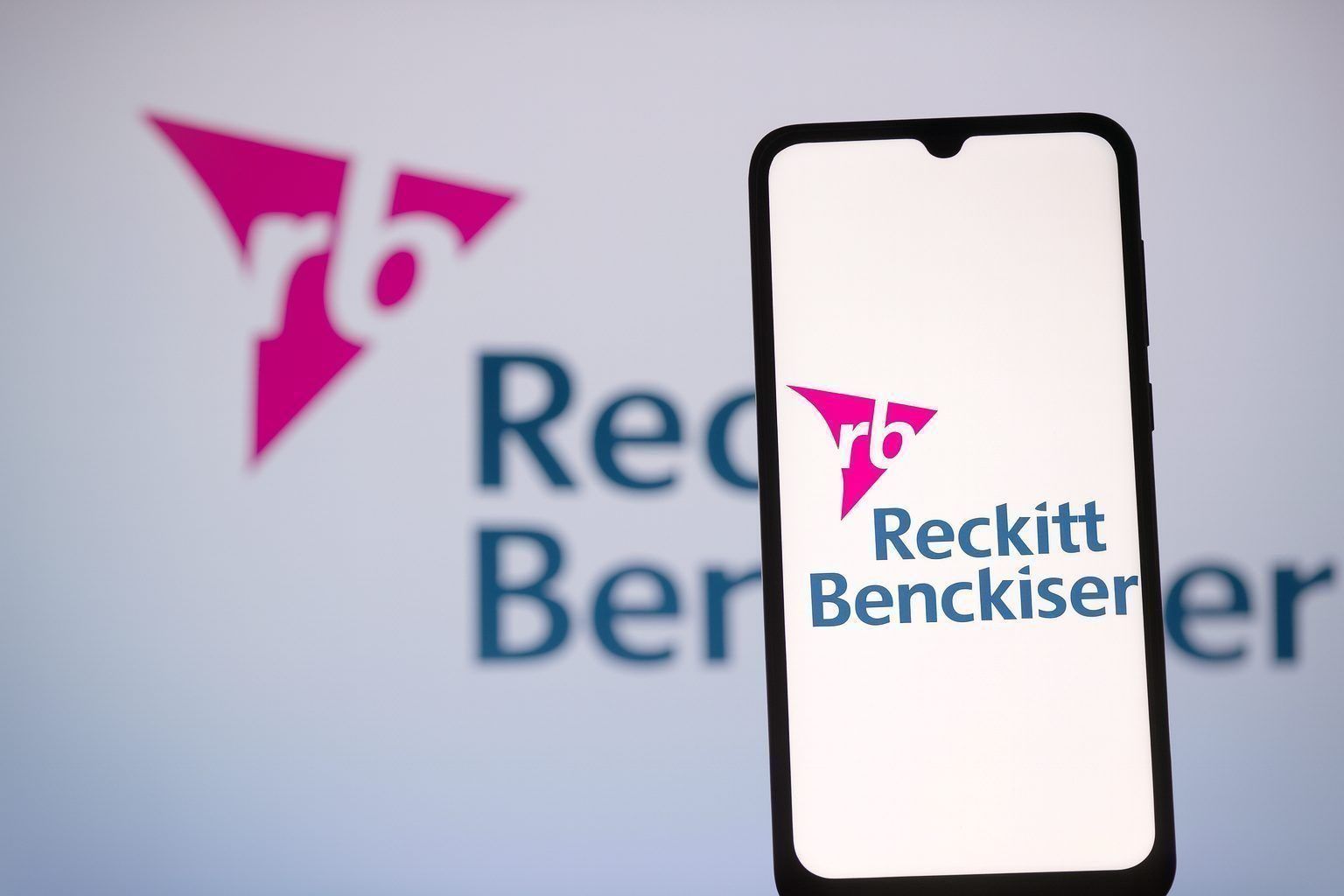Published: 28 November 2025
London — Reckitt Benckiser Group plc (LON:RKT), the FTSE 100 maker of Dettol, Durex and Nurofen, slipped slightly in Friday trading as investors digested another “Transaction in Own Shares” announcement under its £1 billion buyback programme and a higher, but still neutral, price target from JPMorgan. London South East+2London South East+2
Share price today: modest dip after a strong run
As of the latest London South East data on Friday morning, Reckitt shares were trading around 5,848p, down 26p (about ‑0.4%) from Thursday’s close of 5,874p. The stock opened at 5,864p and has so far traded between 5,828p and 5,864p. London South East+1
Over the past month, the shares have moved in a relatively tight band: StockInvest data show a 30‑day range between roughly 5,756p and 5,944p, with Thursday’s close at 5,874p. The 52‑week range runs from about 4,579p at the low to 6,014p at the high, putting the current price roughly 28% above the 1‑year low and only a few percentage points below the high, based on recent closing prices. StockInvest+1
MarketBeat figures cited in recent analyst commentary put Reckitt’s market capitalisation at around £39–40 billion, with a trailing P/E ratio just above 32x, a PEG ratio (price/earnings-to-growth) near 1.1, and a very low beta of about 0.1, underscoring its defensive, low‑volatility profile within the FTSE 100. Defense World+1
Today’s big RNS: another 59,650 shares bought back
The key company-specific news on 28 November 2025 is an early‑morning RNS titled “Transaction in Own Shares”.
Reckitt disclosed that on 27 November 2025 it purchased 59,650 ordinary shares of 10p each from BNP Paribas under the authority granted at the AGM. The volume‑weighted average price paid was 5,866.78p, within an intraday range of 5,848p–5,892p, and the shares will be held in treasury. Following this transaction, Reckitt now holds 58,882,497 shares in treasury and has 673,206,842 ordinary shares in issue, which equates to the current number of voting rights. London South East
This follows a series of similar announcements over the week:
- 26 November trade (RNS dated 27 November): 59,420 shares repurchased at an average of 5,889.07p, taking treasury holdings to 58,823,901 shares and voting rights to 673,265,438. London South East
- 25 November trade (RNS dated 26 November): 59,770 shares bought at an average 5,854.93p, lifting treasury stock to 58,764,481 and leaving 673,324,858 voting shares in issue. Investegate
- 24 November trade (RNS dated 25 November): 59,410 shares at a volume‑weighted average of about 5,890.56p, with 58,704,711 treasury shares and 673,384,628 voting shares afterward. London South East
Across these four consecutive sessions, Reckitt has absorbed just over 238,000 shares in the market — a small but steady reduction in free float that supports earnings per share and signals ongoing capital returns to shareholders.
This activity sits within the company’s 2025 £1 billion share buyback programme, first announced in July and structured into multiple tranches. A 22 October 2025 RNS confirmed that Reckitt had completed a £250 million first tranche, cancelling roughly 4.45 million shares purchased at an average price of £56.23, and launched a second tranche of up to another £250 million running until 30 January 2026. Shares bought in this second tranche are held in treasury until the tranche is completed, at which point they are expected to be cancelled. London South East+1
Taken together, today’s RNS continues a clear pattern: management is using strong cash generation and proceeds from portfolio reshaping to shrink the share count over time, in parallel with ordinary dividends and a future special dividend linked to disposals.
JPMorgan price target raised to 6,100p, but rating stays “neutral”
Alongside the RNS, investors are also digesting fresh broker commentary. A note highlighted by DefenseWorld on Friday reports that JPMorgan Chase & Co has raised its sterling price target on Reckitt from 5,500p to 6,100p, while keeping its “neutral” rating. The new target implies modest upside from current levels and reflects improved confidence after a stronger third quarter. Defense World+1
That report also summarises broader broker sentiment:
- Berenberg has a “hold” rating with a target price around 5,555p.
- RBC Capital Markets rates the shares “outperform” with a target near 6,400p.
- Jefferies maintains “hold” with a target of 5,200p.
- UBS is more bullish, with a “buy” rating and a target around 7,700p, while Deutsche Bank also sits in the “buy” camp with a target around 5,700p. Defense World+1
MarketBeat data referenced in the same coverage points to a “Moderate Buy” consensus rating and an average 12‑month price target of roughly 6,109p for the London listing. Defense World+1
In the US OTC market, Nasdaq and Fintel data show JP Morgan Cazenove reiterating a neutral stance on the ADR (ticker: RBGPF) this week, with an average one‑year target price of about $82.21, implying more than 40% upside from recent US levels — a figure that reflects both currency effects and the ADR’s own trading discount. Nasdaq
Even after today’s small pullback, that leaves Reckitt trading a few percentage points below the sterling‑denominated consensus target, with broker views clustered between cautious “hold” and constructive “buy”.
2025 fundamentals: Q3 acceleration after a solid first half
The fundamental backdrop for today’s moves is a 2025 turnaround story that has gradually gained credibility.
First half 2025
Reckitt’s H1 2025 results showed Core Reckitt like‑for‑like net revenue up about 4.2%, with adjusted operating profit rising around 7% and EPS up roughly 4–5% year‑on‑year, supported by both pricing and efficiency gains from the “Fuel for Growth” cost‑saving programme. Reckitt+2Yahoo Finance+2
Management highlighted particularly strong momentum in emerging markets, where volume growth has remained robust in health and hygiene categories despite macro headwinds. Reckitt+1
Q3 2025: strong quarter, especially in Emerging Markets
The Q3 2025 trading update on 22 October 2025 marked an important inflection point. In that RNS and subsequent earnings commentary:
- Group like‑for‑like net revenue grew around 7% in Q3, taking year‑to‑date LFL growth to roughly 3.3%. Seeking Alpha+1
- Core Reckitt revenue grew 6.7% like‑for‑like, with continued improvement in volumes as well as mix. London South East+1
- Emerging Markets delivered standout performance, with Q3 LFL growth of about 15.5%, and year‑to‑date growth in the low‑teens, driven by health and hygiene demand in markets such as India and China. London South East+1
- Europe moved back into slight positive growth, while North America showed a modest return to volume growth after prior softness. London South East+1
- The Essential Home division continued to decline mid‑single digit, reflecting category softness and the strategic decision to divest the business. London South East+1
Chief executive Kris Licht described Q3 as a “strong” performance, citing sequential volume improvements, the strength of the company’s Powerbrands and “outsized” emerging‑market growth, and reiterated confidence in delivering full‑year 2025 guidance. Reckitt+1
Portfolio reshape: Essential Home sale and focus on Powerbrands
Another important pillar of the investment case in 2025 has been portfolio simplification.
In July 2025, Reckitt agreed to sell a majority stake in its Essential Home cleaning products division — which includes brands such as Cillit Bang and Air Wick — to private equity firm Advent International in a deal valued at up to $4.8 billion (around £3.6 billion including debt). Reuters+2Financial Times+2
Key details from coverage in the Financial Times, Reuters and The Times:
- Essential Home generated about £2 billion of net revenue and £490 million of adjusted operating profit in 2024. Financial Times+1
- Reckitt will retain a 30% stake, so the deal is not a full exit but significantly reduces exposure to a slower‑growing, more cyclical category. Reuters+1
- The company plans to return roughly $2.2 billion (about £1.7 billion) of the proceeds to shareholders through a special dividend and a share consolidation, on top of the existing £1 billion buyback. Reuters+1
- Some analysts criticised the valuation as being up to £1 billion short of their expectations, and noted the retained stake means the exit is not entirely “clean”, but the transaction was still seen as a meaningful step in refocusing on higher‑margin core brands. Financial Times+1
Combined with the ongoing buyback, the Essential Home deal underpins a multi‑year capital‑return story while allowing management to concentrate on health, hygiene and nutrition “Powerbrands” such as Dettol, Durex, Nurofen, Lysol and Mucinex. London South East+2Reckitt+2
Dividends, buybacks and overall capital return profile
Reckitt remains a staple income stock for many UK investors. MarketScreener’s dividend calendar shows: MarketScreener
- A final dividend of about 121.7p per share paid in April 2025.
- An interim dividend of roughly 84.4p per share paid in August 2025.
Together, those two payments total just over £2.06 per share for 2025. At today’s share price near £58.5, that equates to a trailing dividend yield of roughly 3.5%, before taking account of any future special dividend linked to the Essential Home sale. (Yield figure is a simple calculation based on the latest ordinary dividends and current share price; future dividends are not guaranteed.)
Layered on top of this:
- The £1 billion buyback (of which £250m in the first tranche has already been completed and a second £250m tranche is under way). London South East+1
- The planned $2.2 billion special dividend following the Essential Home transaction, expected to complete by year‑end 2025. Reuters+1
The result is a capital‑return profile that is unusually generous even by FTSE 100 consumer‑staple standards, albeit funded partly by asset sales and at a time when the company still faces legal and operational challenges.
Risks and debates still hanging over the stock
Despite the improving growth profile and heavy capital returns, Reckitt is not without controversy.
- Litigation and legal overhang: Investor‑rights law firms in the US have launched class‑action suits over alleged misstatements related to parts of the business, including the Mead Johnson infant nutrition unit, with recent notices inviting RBGLY ADR holders to act as lead plaintiffs. MarketScreener+1 These cases can take years to resolve and may influence sentiment and valuation, even if ultimate financial penalties prove manageable.
- Mead Johnson strategic review: Reuters reporting alongside the Essential Home sale noted that Reckitt is still exploring options for the underperforming Mead Johnson baby formula business, which has faced both operational headwinds and legal scrutiny in the US. Reuters+1
- Execution risk in Emerging Markets: Growth in markets such as India and China remains a bright spot, but it comes with FX volatility, regulatory uncertainty and category‑mix risks. Management has also flagged palm‑oil price swings and input‑cost pressures as watch points in prior commentary. The Economic Times+1
- Deal and valuation criticism: As noted by Breakingviews and other commentators, the Essential Home sale was viewed by some as a “messy” start to a deeper clean‑up of the portfolio, both because the valuation fell short of bullish hopes and because Reckitt retains a 30% stake. Breakingviews+2Financial Times+2
These factors help explain why, despite robust cash returns and improving top‑line trends, the market has not rerated the shares dramatically above their historical trading range.
What today’s moves mean in context
Putting the pieces together for 28 November 2025:
- The share price is experiencing a modest, sub‑1% pullback after a period of relative strength and remains close to the upper end of its 12‑month range. London South East+1
- The buyback RNS confirms that the second £250m tranche of the £1bn programme is in full swing, with roughly 60,000 shares a day being quietly retired (via treasury) in recent sessions. London South East+3London South East+3Lond…
- JPMorgan’s higher 6,100p target and the wider analyst consensus around 6,100p leave the stock trading a few percent below the sterling average target, with more upside suggested in US‑dollar ADR models. Defense World+2MarketBeat+2
- Fundamentally, Q3 confirmed that Core Reckitt is growing mid‑single to high‑single digit, emerging markets are powering ahead, and the Essential Home disposal plus buybacks and dividends are reshaping both the portfolio and the capital structure. London South East+3London South East+3Reck…
For investors, today’s news doesn’t radically change the thesis, but it does reinforce three themes:
- Capital returns remain aggressive, via dividends, buybacks and a likely special dividend.
- Operational momentum is improving, especially in health and hygiene Powerbrands and emerging markets.
- Valuation is not cheap, given the legal and execution risks, but broker models still see moderate upside from current levels.
Key upcoming catalyst
Looking ahead, Reckitt’s next major earnings event is its FY25 results, scheduled for 5 March 2026, according to the company’s financial calendar and third‑party earnings trackers. Reckitt+2Investing.com+2
By that point, investors should have more clarity on:
- The completion and cancellation of the second buyback tranche.
- Progress toward closing the Essential Home transaction and confirming details of the special dividend and share consolidation.
- Any update on the Mead Johnson strategic review and related legal developments.









